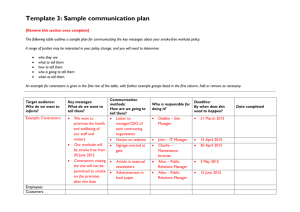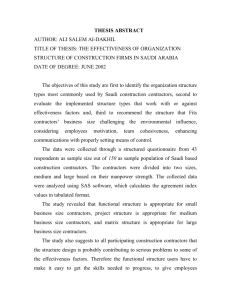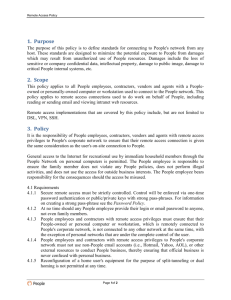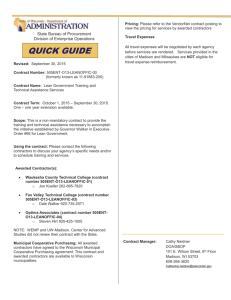PRESS RELEASES
advertisement
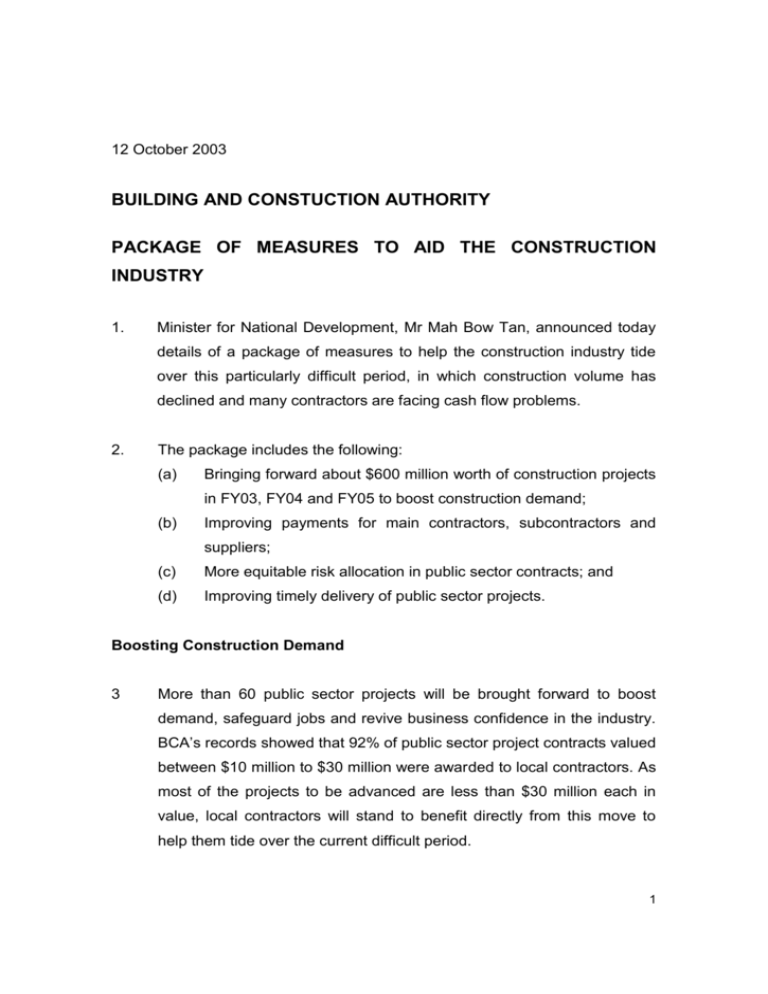
12 October 2003 BUILDING AND CONSTUCTION AUTHORITY PACKAGE OF MEASURES TO AID THE CONSTRUCTION INDUSTRY 1. Minister for National Development, Mr Mah Bow Tan, announced today details of a package of measures to help the construction industry tide over this particularly difficult period, in which construction volume has declined and many contractors are facing cash flow problems. 2. The package includes the following: (a) Bringing forward about $600 million worth of construction projects in FY03, FY04 and FY05 to boost construction demand; (b) Improving payments for main contractors, subcontractors and suppliers; (c) More equitable risk allocation in public sector contracts; and (d) Improving timely delivery of public sector projects. Boosting Construction Demand 3 More than 60 public sector projects will be brought forward to boost demand, safeguard jobs and revive business confidence in the industry. BCA’s records showed that 92% of public sector project contracts valued between $10 million to $30 million were awarded to local contractors. As most of the projects to be advanced are less than $30 million each in value, local contractors will stand to benefit directly from this move to help them tide over the current difficult period. 1 4 These projects, with a total value of about $600 million, comprise civil engineering projects (roads, linkways, parks and drainage improvement works) and building projects (educational institutions, market and food centres, and improvements to community centres/clubs) in about equal proportion. Close to $100 million worth of contracts will be awarded in FY2003 (i.e. by March 2004). Another $360 million worth of contracts will be awarded in FY2004. The rest of the contracts will be awarded in FY 2005 and their details will be announced later (refer to Annex A for list of projects). Improving Payments 5 Besides providing more jobs for contractors, measures will be taken to improve the cash flow of main contractors, subcontractors and suppliers. Improvements will be made to the Public Sector Standard Conditions of Contracts (PSSCOC). BCA, in consultation with the industry, will also work towards implementing a security of payment legislation. Changes to Public Sector Conditions of Contract Shorter timeframe for payment 6 The government will set prompt and clear timelines for the valuation and payment of any changes to construction work (i.e. variation works). Currently, the PSSCOC is silent on the response time for the valuation of variation works. As a result, such work are at times not valued and paid until the end of the contract. The amended PSSCOC will standardise the timeline to value the variation work within 60 days of completion, and issue the payment certificate to the contractor within the next 30 days. 2 7 The PSSCOC will also have a definite timeline to settle final accounts earlier. Currently, there is no standard guideline to settle final payment before the end of the defects liability period (DLP). There will be a new timeline for an interim final account that covers all completed works, except defects and liquidated damages due to delays. This interim final account will be issued within 150 days of substantial completion of the project. Also, there will be a provision to allow for progress claims and payments after substantial completion as the final account is being computed. Removal of “set-off” clause 8 Currently, the PSSCOC allows government agencies to withhold payments to contractors for on-going or completed projects, in order to set-off debts in other projects involving the same contractors. This provision will be removed. This is to reduce any further financial hardship on the contractor by withholding payments from him in another contract. Subcontractors informed of payments by public sector agencies 9 Public sector agencies will make known payments to contractors on notice boards at the site office to inform subcontractors and suppliers. This will prevent contractors from claiming that they have not been paid in order to avoid or delay paying their sub-contractors and suppliers. Security of Payment Legislation 10 To address the payment problems faced by contractors, subcontractors and suppliers across the construction value chain, BCA has looked at the feasibility of a security of payment legislation that has been implemented in UK, New Zealand and some states in Australia. The legislation provides a statutory right for any party across the construction 3 value chain to seek payment for work done and materials supplied. It upholds the principle that one should be paid for work that has been done. BCA has had several discussions with the industry on this. 11 The conclusion at this stage is that legislation is necessary because at the lower end of the value chain, subcontractors/suppliers have limited recourse for payment disputes, other than expensive litigation or timeconsuming arbitration. Such prolonged settlements have resulted in many becoming insolvent, bringing about disruption to projects and financial hardship. 12 This legislation will allow progress payment disputes to be resolved via adjudication. Adjudication is faster and less costly than the current system of arbitration because the adjudicator’s decision is made within a short timeframe and the decision is legally binding. 13 However, some provisions in the legislation such as “the right to suspend work” would require further consultation with the industry. Over the next few months, BCA will discuss further with the industry on the details of a security of payment legislation that will suit the Singapore context. Reallocating Contractors’ Risk in Unforeseen Soil Conditions and Underground Services 14 Present market practice requires contractors to price into their tender bids the risk of unforeseen soil conditions. For underground services, public sector agencies usually pay for the diversion of such services, but not for the cost of any resulting delays. 4 15 New guidelines will be incorporated into the PSSCOC requiring public sector agencies to provide more information on soil profile and underground services as part of the tender information. The agencies will bear the cost of additional works, if the soil profiles or underground services deviate substantially from that provided in the tender information. This will substantially reduce the risks borne by contractors and enable more realistic tender bids. Improving Project Delivery in Public Sector 16 To improve timely delivery of public sector projects, the BCA will finetune the construction procurement system with the following measures:(a) Relax the track record requirement for construction companies to renew their existing Contractors Registry System (CRS) grades; (b) Tighten financial reporting by construction companies in the CRS. Relaxing track record requirement for renewal 17 Currently, contractors need to submit their track record of completed projects in the last 3 years as a criterion to renew and maintain their current CRS grade. With the reduction of construction demand in recent years, some contractors may find it hard to meet the track record requirement and some may even resort to submitting low bids or “suicide bids” in order to maintain their grade. 18 Therefore, BCA will extend the qualifying period for CRS grading from the present 3 years to 5 years to allow companies to add another 2 more years of completed projects into their track record. In addition, on-going projects will also be allowed. Hence, construction firms will be less pressured to bid for contracts at untenable prices, just to satisfy the required track record. 5 Tightening of financial checks on contractors under CRS 19 The BCA will also tighten its CRS to better reflect the financial standing of contractors tendering for public sector projects. With immediate effect, the timeframe for submitting financial audited accounts will be shortened:- (a) From 8 months to 4 months from the end of the financial year for firms listed on the Singapore Stock Exchange; and (b) 20 From 8 months to 6 months for non-listed firms. This requirement will apply to the top three registration grades, A1, A2 and B1 contractors. It will affect companies with financial year closing on and after 31 December 2003. The timely provision of financial health reports will assist public sector agencies during the tender process to select contractors capable of undertaking projects within their financial capacity. (Refer to Annex B for implementation timeline of measures to improve payment, reallocate contractors’ risk and improve public sector project delivery) Conclusion 21 The measures unveiled in this package will not solve all the problems in the construction industry. However, it will provide some financial respite for contractors, serve to improve payments through the value chain and give greater assurance that public projects will continue to be completed on time. 6 ANNEX A TABLE 1A - LIST OF PROJECTS TO BE ADVANCED IN FY 2003 No. Project Description Agency 1 Integrated Programme - Expansion of Raffles JC MOE 2 Upgrading of West Coast Highway and Jln Buroh to Semi-expressway - Ph 3F MOT 3 Widening of Farrer Rd MOT 4 Widening of PIE from KJE to JAI MOT 5 Bus Interchange -Temporary MOT 6 Linkway Project Phase 3 Package 1 MOT 7 Linkway Project Phase 3 Package 2 MOT 8 Linkway Project Phase 3 Package 3 MOT 9 Linkway Project Phase 3 Package 4 MOT 10 Symphony Stage: Singapore Botanic Gardens NParks 11 East Coast Park Interim Upgrading Phase 2 NParks 12 A Revamped Maintenance Programme for PA's Premises* PA Estimated Total for FY2003 (20 projects): $100 mil * A total of 9 projects under this Programme will be advanced. 7 TABLE 1B - LIST OF PROJECTS TO BE ADVANCED IN FY 2004 No. Project Description Agency 1 Slope Protection @ Bukit Batok N3 (Pt3) HDB 2 Road Culverts HDB 3 Widening of Roads @ Strathmore, Dawson HDB 4 Print Hub (part of super highrise project) JTC 5 Infrastructural Works at Tuas Biomedical Park 2 JTC 6 Road Infrastructural Works JTC 7 Refurbishment Works for Flatted Factories JTC 8 Expansion of Workshop Facilities at Lim Chu Kang Regional Base MHA 9 PRIME Phase 6 (10 schools) MOE 10 Integrated Programme - Expansion of Anglo-Chinese School (Independent) MOE 11 Integrated Programme - Expansion of The Chinese High School and Hwa Chong JC MOE 12 Rebuilding and Upgrading of Markets and Food Centres NEA 13 Hillview Park Connector 14 Extension to Kim Seng Community Centre PA 15 Upgrading of Outdoor Stage & Minor Extension to Telok Ayer Hong Lim Green Community Centre PA 16 Improvement to Roadside Drains under Batch 3 of EUP* PUB 17 Design Package T-Link Sewer Project Contract 2 PUB 18 Riverwall Improvement to Sungei Punggol - Contract 8 PUB 19 Riverwall Improvement to Sungei Punggol - Contract 9 PUB 20 Improvement to Tanglin Halt Outlet Drain - Contract 1 PUB 21 Mangrove Boardwalk at Changi Point URA 22 Eastern Boardwalk at Changi Point URA 23 Promenade at Changi Point URA 24 Southern Ridges projects URA NParks Estimated Total for FY2004 (About 42 projects): $360 mil *This consists of 5 projects . 8 ANNEX B IMPLEMENTATION TIMELINE FOR PACKAGE OF MEASURES TO IMPROVE PAYMENT, REALLOCATE CONTRACTORS’ RISK AND IMPROVE PUBLIC SECTOR PROJECT DELIVERY Measures Implementation Timeline Improve payment and reallocate contractors’ risk Amendments to the Public Sector Conditions of Contract (PSSCOC). (a) Make payments to contractors known to their sub-contractors and suppliers. To be implemented with effect from 1 January 04. (b) Introduce new timeframes for progress payments and settlement of variation orders and final account. To be implemented with effect from 1 January 04. (c) Remove the provision for agencies to withhold payments to contractors to set-off debts in other contracts. To be implemented with effect from 1 January 04. (d) Reallocate contractors’ risk in public sector construction projects. To be implemented with effect from 1 January 04. Security of payment legislation. Work towards the implementation of a Security of Payment Legislation. Improve timely delivery of public sector projects Relax the track record requirement for construction companies to renew their existing Construction Registry System (CRS) grades. To be immediately. Tighten financial reporting by construction companies in the CRS. To be implemented immediately and will affect companies with accounting year closing on and after 31 December 2003. implemented 9
